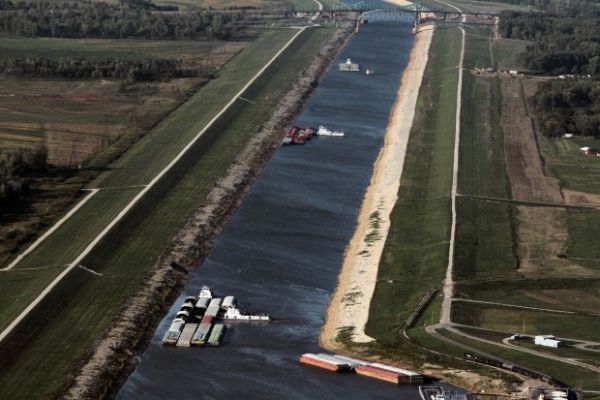Low Water Levels on the Mississippi River To Affect Economy

The environment and climate change were not only discussed in a limited manner during the election season, but the current Doha Climate Change Conference, hosted by the United Nations (UN) until December 7, is not making headlines either. Will the imminent economic disaster resulting from Mississippi's record low-water mark shift the focus to this issue?
In 2012, the United States experienced the worst drought in at least 50 years and its consequences on the US agricultural industry, the meat industry, and the rise in food prices have been well discussed. These droughts have been linked to a rise in the number of Americans who believe in climate change.
The situation of the Mississippi River is, however, a lesser discussed issue. The Mississippi River, which runs 2,500 miles from northern Minnesota to the Gulf of Mexico, is a major artery of the US economy and will be greatly affected by this year's drought. Roughly $7 billion worth of goods are transported on the river during December and January alone, thus making a traffic disruption an economic disaster.
The Mississippi River waterway system and its numerous barges are responsible for carrying 60 percent of the country's cereal exports, 20 percent of the oil and gas production, 20 percent of the country's coal production, and many other goods. Waterway transportation is considered to be the cheapest mode of transportation, costing $11 a ton, which is less than rail or truck, according to the American Waterways Operators (AWO), a 350-member trade association representing the nation’s tugboat, towboat, and barge industry.
This economic sector is directly affected by the decreasing level of the river. According to Tom Allegretti, CEO of AWO, losing one foot of draft, the distance from the ship’s waterline to the bottom of the vessel, results in a loss of 204 tons of cargo capacity per barge.
For the lower Mississippi, the larger part of the river, a tow usually consist of 30-45 barges so the loss of one foot of draft would result in a decreased capacity of 9,000 tons. “This would be the equivalent of adding 130 tractor-trailer trucks to the highways or 570 rail cars on the rail system for just one large tow,” explained Mr. Allegretti.
The water-mark, already at very low level between Saint Louis and Cairo, a necessary passage for exports, is facing many obstacles in December and January, which are usually the months the river is at its lowest because of the limited rain during the fall season and the freezing of many tributaries. Due to its low level, rock pinnacles appear in the river and need to be removed by the US Army Corps of Engineers (USACE).
The other threat is the diminution of the water flow coming from the Missouri River -- approximately 60% of the Mississippi water after St. Louis -- which is decided by the USACE.
Following the Missouri management plan approved by Congress, the USACE started to reduce the flow from the Missouri dam on November 23 to preserve water resources for the upstream region. The management plan gives no consideration to the consequences on the Mississippi River as the corps "have the legal authority to operate the Missouri River solely for the benefits of the Mississippi River.”
Lawmakers and industries affected by the Mississippi water levels have urged President Obama to order the USACE to accelerate the removal of the rocks, as well as lessen the annual flow restriction from the Missouri.
The AWO warns of the potential economic impact of low traffic on the Mississippi River between December and January, which would put billions in key products at risk, including over 7 million tons of agricultural products worth $2.3 billion; 1.7 million tons of chemical products worth $1.8 billion; 1.3 million tons of petroleum products worth over $1.3 billion; over 700,000 tons of crude oil worth $534 million; and 3.8 million tons of coal worth $192 million.
As the government will need to intervene to avoid an economic disaster, the issue of low water levels on the Mississippi will likely occur more often in the future if nothing is done to curb climate change. Maybe this latest consequence of climate change will encourage the United States to have a more active role in the conference in Doha before it ends in December.




